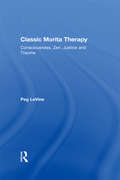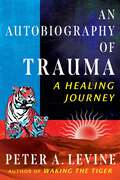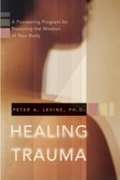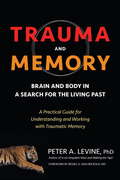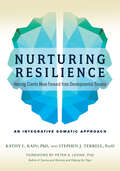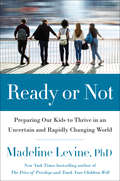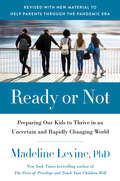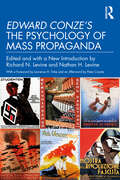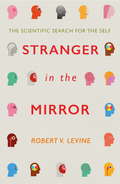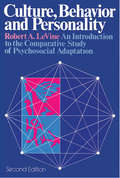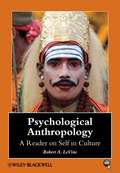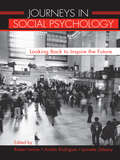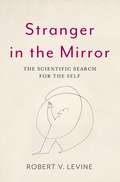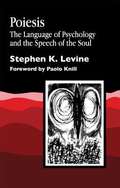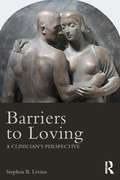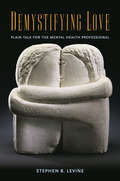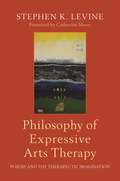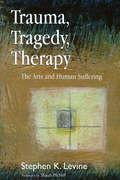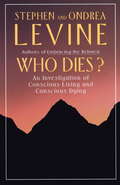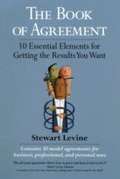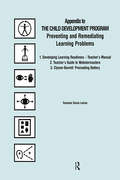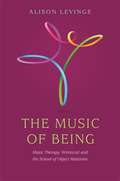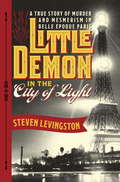- Table View
- List View
Taking Sides: Clashing Views In Urban Studies
by Myron Alfred LevineUrban affairs deals with important issues and policy questions. It is at the local level—at the regional, city, and even at the street level—that government decisions concerning law enforcement, schooling, housing, transportation, land use, and the environment, have the greatest impact on people's lives.
Classic Morita Therapy: Consciousness, Zen, Justice and Trauma
by Peg LeVineShoma (Masatake) Morita, M.D. (1874-1938) was a Japanese psychiatrist-professor who developed a unique four stage therapy process. He challenged psychoanalysts who sanctioned an unconscious or unconsciousness (collective or otherwise) that resides inside the mind. Significantly, he advanced a phenomenal connection between existentialism, Zen, Nature and the therapeutic role of serendipity. Morita is a forerunner of eco-psychology and he equalised the strength between human-to-human attachment and human-to-Nature bonds. This book chronicles Morita’s theory of "peripheral consciousness", his paradoxical method, his design of a natural therapeutic setting, and his progressive-four stage therapy. It explores how this therapy can be beneficial for clients outside of Japan using, for the first time, non-Japanese case studies. The author’s personal material about training in Japan and subsequent practice of Morita’s ecological and phenomenological therapy in Australia and the United States enhance this book. LeVine’s coining of "cruelty-based trauma" generates a rich discussion on the need for therapy inclusive of ecological settings. As a medical anthropologist, clinical psychologist and genocide scholar, LeVine shows how the four progressive stages are essential to the classic method and the key importance of the first "rest" stage in outcomes for clients who have been embossed by trauma. Since cognitive science took hold in the 1970s, complex consciousness theories have lost footing in psychology and medical science. This book reinstates "consciousness" as the dynamic core of Morita therapy. The case material illustrates the use of Morita therapy for clients struggling with the aftermath of trauma and how to live creatively and responsively inside the uncertainty of existence. The never before published archival biographic notes and photos of psychoanalyst Karen Horney, Fritz Perls, Eric Fromm and other renowned scholars who took an interest in Morita in the 1950s and 60s provide a dense historical backdrop.
An Autobiography of Trauma: A Healing Journey
by Peter A. Levine• Shares the author&’s personal journey to heal his severe childhood trauma as well as his breakthroughs on the path to create Somatic Experiencing• Explores how he came to view Einstein as his personal spirit guide and mentor, only to discover a profound real-life connection to him through his mother• Explains how the SE method is derived from the author&’s studies of animals in their natural environments, neurobiology, and 50 years of clinical observationsIn this intimate memoir, renowned developer of Somatic Experiencing, Peter A. Levine—the man who changed the way psychologists, doctors, and healers understand and treat the wounds of trauma and abuse—shares his personal journey to heal his own severe childhood trauma and offers profound insights into the evolution of his innovative healing method.Casting himself as a modern-day Chiron, the wounded healer of Greek mythology, Levine describes, in graphic detail, the violence of his childhood juxtaposed with specific happy memories and how being guided through Somatic Experiencing (SE) allowed him to illuminate and untangle his traumatic wounds. He also shares the mysterious and unexpected dreams and visions that have guided him through his life&’s work, including his dreamlike visitations from Albert Einstein, whom he views as his personal spirit guide and mentor.Explaining how he helped thousands of others before resolving his own trauma, he details how the SE method is derived from his studies of wild animals in their natural environments, neurobiology, and more than 50 years of clinical observations. Levine teaches us that anyone suffering from trauma has a valuable story to tell, and that by telling our stories, we can catalyze the return of hope, dignity, and wholeness.
Healing Trauma: A Pioneering Program For Restoring The Wisdom Of Your Body
by Peter A. LevineResearchers have shown that survivors of accidents, disaster, and childhood trauma often en endure lifelong symptoms ranging from anxiety and depression to unexplained physical pain, fatigue, illness, and harmful "acting out" behaviors. Today, professionals and clients in both the bodywork and the psychotherapeutic fields nationwide are turning to Peter A. Levine's breakthrough Somatic Experiencing methods to actively overcome these challenges. In Healing Trauma, Dr. Levine gives you the personal how-to guide for using the theory he first introduced in his highly acclaimed work Waking the Tiger. Join him to discover: how to develop body awareness to "renegotiate" and heal traumas by "revisiting" them rather than reliving them; emergency "first-aid" measures for times of distress; and nature's lessons for uncovering the physiological roots of your emotions.
Trauma and Memory
by Peter A. Levine Bessel A. van der KolkIn Trauma and Memory, bestselling author Dr. Peter Levine (creator of the Somatic Experiencing approach) tackles one of the most difficult and controversial questions of PTSD/trauma therapy: Can we trust our memories? While some argue that traumatic memories are unreliable and not useful, others insist that we absolutely must rely on memory to make sense of past experience. Building on his 45 years of successful treatment of trauma and utilizing case studies from his own practice, Dr. Levine suggests that there are elements of truth in both camps. While acknowledging that memory can be trusted, he argues that the only truly useful memories are those that might initially seem to be the least reliable: memories stored in the body and not necessarily accessible by our conscious mind.While much work has been done in the field of trauma studies to address "explicit" traumatic memories in the brain (such as intrusive thoughts or flashbacks), much less attention has been paid to how the body itself stores "implicit" memory, and how much of what we think of as "memory" actually comes to us through our (often unconsciously accessed) felt sense. By learning how to better understand this complex interplay of past and present, brain and body, we can adjust our relationship to past trauma and move into a more balanced, relaxed state of being. Written for trauma sufferers as well as mental health care practitioners, Trauma and Memory is a groundbreaking look at how memory is constructed and how influential memories are on our present state of being.
Waking the Tiger - Healing Trauma: The Innate Capacity to Transform Overwhelming Experiences
by Peter A. Levine Ann FrederickA breakthrough book on the healing of trauma by the developer of Somatic Experiencing
Nurturing Resilience: Helping Clients Move Forward from Developmental Trauma--An Integrative Somatic Approach
by Peter A. Levine Kathy L. Kain Stephen J. TerrellA practical, integrated approach for therapists working with people (both adults and children) who have been impacted by developmental trauma and attachment difficultiesKathy L. Kain and Stephen J. Terrell draw on fifty years of their combined clinical and teaching experience to provide this clear road map for understanding the complexities of early trauma and its related symptoms. Experts in the physiology of trauma, the authors present an introduction to their innovative somatic approach that has evolved to help thousands improve their lives. Synthesizing across disciplines--Attachment, Polyvagal, Neuroscience, Child Development Theory, Trauma, and Somatics--this book provides a new lens through which to understand safety and regulation. It includes the survey used in the groundbreaking ACE Study, which discovered a clear connection between early childhood trauma and chronic health problems. For therapists working with both adults and children and anyone dealing with symptoms that typically arise from early childhood trauma--anxiety, behavioral issues, depression, metabolic disorders, migraine, sleep problems, and more--this book offers fresh hope.
Ready or Not: Preparing Our Kids to Thrive in an Uncertain and Rapidly Changing World
by Madeline Levine PhDThe New York Times bestselling author of The Price of Privilege and Teach Your Children Well explores how today’s parenting techniques and our myopic educational system are failing to prepare children for their certain-to-be-uncertain future—and how we can reverse course to ensure their lasting adaptability, resilience, health and happiness.In The Price of Privilege, respected clinician, Madeline Levine was the first to correctly identify the deficits created by parents giving kids of privilege too much of the wrong things and not enough of the right things. Continuing to address the mistaken notions about what children need to thrive in Teach Your Children Well, Levine tore down the myth that good grades, high test scores, and college acceptances should define the parenting endgame. In Ready or Not, she continues the discussion, showing how these same parenting practices, combined with a desperate need to shelter children from discomfort and anxiety, are setting future generations up to fail spectacularly.Increasingly, the world we know has become disturbing, unfamiliar, and even threatening. In the wake of uncertainty and rapid change, adults are doubling-down on the pressure-filled parenting style that pushes children to excel. Yet these daunting expectations, combined with the stress parents feel and unwittingly project onto their children, are leading to a generation of young people who are overwhelmed, exhausted, distressed—and unprepared for the future that awaits them. While these damaging effects are known, the world into which these children are coming of age is not. And continuing to focus primarily on grades and performance are leaving kids more ill-prepared than ever to navigate the challenges to come.But there is hope. Using the latest developments in neuroscience and epigenetics (the intersection of genetics and environment), as well as extensive research gleaned from captains of industry, entrepreneurs, military leaders, scientists, academics, and futurists, Levine identifies the skills that children need to succeed in a tumultuous future: adaptability, mental agility, curiosity, collaboration, tolerance for failure, resilience, and optimism. Most important, Levine offers day-to-day solutions parents can use to raise kids who are prepared, enthusiastic, and ready to face an unknown future with confidence and optimism.
Ready or Not: Preparing Our Kids to Thrive in an Uncertain and Rapidly Changing World
by Madeline Levine PhDThe New York Times bestselling author of The Price of Privilege and Teach Your Children Well explores how today’s parenting techniques and our myopic educational system are failing to prepare children for their certain-to-be-uncertain future—and how we can reverse course to ensure their lasting adaptability, resilience, health and happiness.In The Price of Privilege, respected clinician, Madeline Levine was the first to correctly identify the deficits created by parents giving kids of privilege too much of the wrong things and not enough of the right things. Continuing to address the mistaken notions about what children need to thrive in Teach Your Children Well, Levine tore down the myth that good grades, high test scores, and college acceptances should define the parenting endgame. In Ready or Not, she continues the discussion, showing how these same parenting practices, combined with a desperate need to shelter children from discomfort and anxiety, are setting future generations up to fail spectacularly.Increasingly, the world we know has become disturbing, unfamiliar, and even threatening. In the wake of uncertainty and rapid change, adults are doubling-down on the pressure-filled parenting style that pushes children to excel. Yet these daunting expectations, combined with the stress parents feel and unwittingly project onto their children, are leading to a generation of young people who are overwhelmed, exhausted, distressed—and unprepared for the future that awaits them. While these damaging effects are known, the world into which these children are coming of age is not. And continuing to focus primarily on grades and performance are leaving kids more ill-prepared than ever to navigate the challenges to come.But there is hope. Using the latest developments in neuroscience and epigenetics (the intersection of genetics and environment), as well as extensive research gleaned from captains of industry, entrepreneurs, military leaders, scientists, academics, and futurists, Levine identifies the skills that children need to succeed in a tumultuous future: adaptability, mental agility, curiosity, collaboration, tolerance for failure, resilience, and optimism. Most important, Levine offers day-to-day solutions parents can use to raise kids who are prepared, enthusiastic, and ready to face an unknown future with confidence and optimism.
Edward Conze's The Psychology of Mass Propaganda
by Richard N. Levine Nathan H. LevineEdward Conze’s The Psychology of Mass Propaganda presents a commentary on the psychology of propaganda during the rise of fascism in Europe in the 1930s. It discusses the conditions which generate vulnerability to misinformation in human societies, and thus offers insight into how propaganda may be "withstood." Completed in 1939, during the period of Conze’s own inflection from Marxist philosophy to Buddhist studies, the original manuscript was never published and is now in print for the first time. Presenting a unique historical perspective, while also appealing to an acutely topical interest in the conditions under which autocracy and fascism arise, the book examines the psychology of mass propaganda through copious contemporary and historical examples. Conze focuses especially on recent news articles and the statements of the propagandists of many of the governments that would go on to participate in the Second World War, including Germany, Italy, the USSR, USA and UK, all of which he interprets through the lens of recent psychological and historical research. The book has been edited and includes a new introduction by Richard N. Levine and Nathan H. Levine, also featuring a foreword by American legal scholar Laurence H. Tribe, and an afterword by actor, director, writer, and Buddhist priest Peter Coyote. This is a fascinating opportunity for scholars across several disciplines, including political scientists and psychologists, historians and sociologists, to access one of Conze’s previously unpublished works. It will also be of importance to those interested in Conze’s work on Buddhist philosophy, and in the psychology of propaganda more broadly.
Stranger in the Mirror: The Scientific Search for the Self
by Robert LevineWho are we? Where is the boundary between us and everything else? Are we all multiple personalities? And how can we control who we become?From distinguished psychologist Robert Levine comes this provocative and entertaining scientific exploration of the most personal and important of all landscapes: the physical and psychological entity we call our self. Using a combination of case studies and cutting-edge research in psychology, biology, neuroscience, virtual reality and many other fields, Levine challenges cherished beliefs about the unity and stability of the self - but also suggests that we are more capable of change than we know. Transformation, Levine shows, is the human condition at virtually every level. Physically, our cells are unrecognizable from one moment to the next. Cognitively, our self-perceptions are equally changeable: A single glitch can make us lose track of a body part or our entire body, or to confuse our very self with that of another person. Psychologically, we switch back and forth like quicksilver between incongruent, sometimes adversarial sub-selves. Socially, we appear to be little more than an ever-changing troupe of actors. And, culturally, the boundaries of the self vary wildly around the world - from the confines of one's body to an entire village. The self, in short, is a fiction: vague, arbitrary, and utterly intangible. But it is also interminably fluid. And this unleashes a world of potential. Engaging, informative, and ultimately liberating, Stranger in the Mirror will change forever how you think about your self - and what you might become.
Culture, Behavior, and Personality: An Introduction to the Comparative Study of Psychosocial Adaptation
by Robert A LeVineThis new edition of Culture, Behavior, and Personality is organized into ve parts. Part I de nes the eld of inquiry, Part II presents a critical review of existing theories and methods, Part III expounds LeVine's unique Darwinian model of culture and personality, Part IV deals with the strategies and methods with which to study individual dispositions within the sociocultural matrix, Part V concludes with two essays on cultural and personality research including new advances and avenues of research that have appeared within the last seven years.
Psychological Anthropology: A Reader on Self in Culture
by Robert A. LevineDrawing from some of the most significant scholarly work of the 19th and 20th centuries, the Blackwell Anthologies in Social and Cultural Anthropology series offers a comprehensive and unique perspective on the ever-changing field of anthropology. It represents both a collection of classic readers and an exciting challenge to the norms that have shaped this discipline over the past century.
Journeys in Social Psychology: Looking Back to Inspire the Future
by Robert Levine Aroldo Rodrigues Lynnette ZeleznyThis volume consists of personal narrative accounts of the career journeys of some of the world's most eminent social psychologists. Each contributing psychologist is an esteemed scholar, an excellent writer, and has a story to tell. Together, the contributions cover a time range from Morton Deutsch to today, and touch upon virtually every important movement and person in the history of academic social psychology. This book provides a fascinating insight into the development of outstanding academic careers and will be a source of inspiration to seasoned researchers and beginning students alike, in the fields of social psychology, history of psychology, and beyond.
Stranger in the Mirror: The Scientific Search for the Self
by Robert V. LevineIn Stranger in the Mirror, Robert Levine offers a provocative and entertaining scientific exploration of the most personal and important of all landscapes: the physical and psychological entity we call our self. Who are we? Where is the boundary between us and everything else? Are we all multiple personalities? And how can we control who we become?Levine tackles these and other questions with a combination of surprising stories, case studies, and cutting-edge research--from psychology, biology, neuroscience, virtual reality, and many other fields. The result challenges cherished beliefs about the unity and stability of the self--but also suggests that we are more capable of change than we know.Transformation, Levine shows, is the human condition at virtually every level. Physically, our cells are unrecognizable from one moment to the next. Cognitively, our self-perceptions are equally changeable: A single glitch can make us lose track of a body part or our entire body--or to confuse our very self with that of another person. Psychologically, we switch back and forth like quicksilver between incongruent, sometimes adversarial subselves. Socially, we appear to be little more than an ever-changing troupe of actors. And, culturally, the boundaries of the self vary wildly around the world--from the confines of one's body to an entire village.The self, in short, is a fiction--vague, arbitrary, and utterly intangible. But it is also interminably fluid. And this, Levine argues, unleashes a world of potential. Fluidity creates malleability. And malleability creates possibilities.Engaging, informative, and ultimately liberating, Stranger in the Mirror will change forever how you think about your self--and what you might become.
Poiesis: The Language of Psychology and the Speech of the Soul
by Stephen LevineStephen K. Levine argues that poiesis, the creative act, is also the act by which we affirm our identity and humanity; in exploring this subject he shows the essential affinity of the creative and the therapeutic processes and explores the nature of creative acts. This book looks in detail at the connections between expressive arts, such as poetry, and psychology and develops understanding of the theoretical foundations which connect the arts and psychotherapy. It considers the context in which modern therapy emerged and looks at various aspects of different arts therapies. It provides a much-needed step in the theoretical underpinning of the expressive therapies.
Barriers to Loving: A Clinician's Perspective
by Stephen B. LevineBarriers to Loving is an intriguing exploration of the role of sexual love over the course of life. Beginning with the mental health professions’ avoidance of the topic, Levine proposes a compendium of love’s pathologies by reorganizing what is familiar to clinicians into the barriers that limit the formation of adult-adult love, impediments that diminish a partner’s lovability, and the impediments to feeling and expressing love for a partner. Before reviewing scientific contributions to the understanding of love, he explores the topics of sexual excess and infidelity and how they relate to the aspiration to love and be loved. The final two chapters synthesize with clarity what to teach about love to young professionals in order to prepare them for the complexities they will soon encounter and provide a sophisticated answer to the question, What is love? Barriers to Loving integrates humanism, science, and clinical experience in Levine’s long-appreciated unique and mature voice.
Demystifying Love: Plain Talk for the Mental Health Professional
by Stephen B. LevineIntended primarily for mental health professionals, Demystifying Love deals plainly with topics rarely written about for clinicians. The book discusses in a small package highly readable and useful topics, such as love (as both noun and verb), psychological intimacy, sexual desire, as well as infidelity, both in background concepts and clinical guidelines. As the book shows, love is the logical point of departure for a clinical understanding of sexuality and its problems. It is the most conventional framework for understanding sexual behaviors, the one that is broadly endorsed across many cultures, often as the ideal context for sexual expression. The book integrates an analysis of love in patients dealing with intimacy, sexual desire, infidelity, forgiveness and reconciliation. Detailed with compelling case studies, the author’s skill as a therapist comes through in the discussion of these topics—many of which are at the heart of numerous couple problems. In creating this illuminating work for mental health professionals, Dr. Levine may have underestimated its appeal. Dr. Levine’s ability to shed light on our internal processes as we love and attempt to be loved throughout life may prove to be of interest to a far broader audience.
Philosophy of Expressive Arts Therapy: Poiesis and the Therapeutic Imagination
by Stephen K. LevineLaying the philosophical foundations of expressive arts therapy, this book highlights the role and importance of poiesis, the art of 'making' as a response to the world, in the expressive arts therapies as well as our own lives. The concept of poiesis was originally developed and brought into the field by Stephen K. Levine. It is a perspective that restores the primacy of the arts for the arts therapies instead of reducing art-making and art-objects to psychological data. Bringing together different schools of thought in unexpected ways, this book shows how the principles underlying expressive arts therapy have relevance to ethics, politics and social change. It includes chapters on Taoism, improvisation in the arts, and the importance of creativity for understanding human existence. With personal narratives and poetry to help create natural points for the reader to stop and reflect, Philosophy of Expressive Arts Therapy is the perfect guide for those wanting to understand the role of the arts and art-making in life and in therapeutic change.
Trauma, Tragedy, Therapy
by Stephen K. LevineStephen K. Levine's new book explores the nature of traumatic experience and the therapeutic role of the arts and arts therapies in responding to it. It suggests that by re-imagining painful and tragic experiences through art-making, we may release their fixity and negative hold on our lives and resist the temptation to assume the role of the victim. Among the many concerns that the book addresses is the damage done by the tendency to adopt stock methods of understanding and superficial explanations for the depths, complexities, wonders, and exasperations of human experience. The book explores the chaos and fragmentation inherent in both art and human existence and the ways in which memory and imagination can find meaning by acknowledging this chaos and embodying it in appropriate forms. The book builds on the important theories of Stephen K. Levine's previous book, Poiesis: The Language of Psychology and the Speech of the Soul, also published by Jessica Kingsley Publishers. It challenges dominant psychological perspectives on trauma and provides a new framework for arts therapists, psychotherapists, psychologists and social scientists to understand the effectiveness of the arts therapies in responding to human suffering.
Who Dies?
by Stephen Levine Ondrea LevineThis is the first book to show the reader how to open to the immensity of living with death, to participate fully in life as the perfect preparation for whatever may come next. Levine provides calm compassion rather than the frightening melodrama of death.
Book of Agreement: 10 Essential Elements for Getting the Results You Want
by Stewart LevineThe Book of Agreement suggests that it is best to change the process of forming agreements from an adversarial, win/lose negotiation, to a joint visioning process.
The Child Development Program: Preventing and Remediating Learning Problems
by Suzanne Sosna Levine"The Child Development Program: Preventing and Remediating Learning Problems" is divided into two books. The first book outlines the Child Development Program, specifically explaining what it is and how it can be implemented. It is written in sensible, straightforward language, describing the procedures, materials, and "how-to" every step of the way.
The Music of Being: Music Therapy, Winnicott and the School of Object Relations
by Alison LevingeThis book explores how the work of key child development theorists informs music therapy practice with children and families. Focusing primarily on the theoretical thinking and understanding of the paediatrician and psychoanalyst Donald Winnicott, Alison Levinge highlights how his theories resonate with the central aspects of music therapy. Central to the book are Winnicott's ideas on play and an exploration of his understanding of the psychological processes of 'holding'. Winnicott's theories are given greater depth and understanding by referencing the writings of Adam Phillips and Christopher Bollas. Consideration of relevant aspects of Bowlby's theories will also be included. Knowledge of these theories of child development helps to support understanding of the music therapy process, making this book vital reading for both students and practitioners of music therapy.
Little Demon in the City of Light
by Steven LevingstonA delicious account of a murder most gallic--think CSI Paris meets Georges Simenon--whose lurid comibation of sex, brutality, forensics, and hypnotism riveted first a nation and then the world.Little Demon in the City of Light is the thrilling--and so wonderfully French--story of a gruesome 1889 murder of a lascivious court official at the hands of a ruthless con man and his pliant mistress and the international manhunt, sensational trial, and an inquiry into the limits of hypnotic power that ensued.In France at the end of the nineteenth century a great debate raged over the question of whether someone could be hypnotically compelled to commit a crime in violation of his or her moral convictions. When Toussaint-Augustin Gouffé entered 3, rue Tronson du Coudray, he expected nothing but a delightful assignation with the comely young Gabrielle Bompard. Instead, he was murdered--hanged!--by her and her companion Michel Eyraud. The body was then stuffed in a trunk and dumped on a riverbank near Lyon.As the inquiry into the guilt or innocence of the woman the French tabloids dubbed the "Little Demon" escalated, the most respected minds in France debated whether Gabrielle Bompard was the pawn of her mesmerizing lover or simply a coldly calculating murderess. And, at the burning center of it all: Could hypnosis force people to commit crimes against their will?

